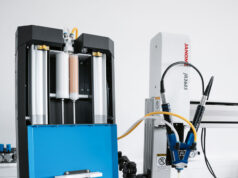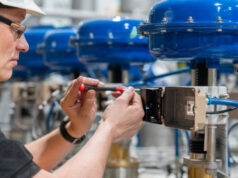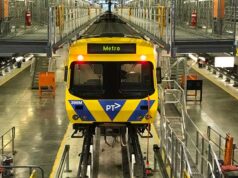Compressed air is one of the least efficient forms of energy that is used in modern manufacturing plants. It takes seven to
eight times more electricity to produce one horsepower with compressed air than with an electric motor. Compressed
air is often the largest end-use of electricity in a plant.
There are many actions a plant manager can take that will quickly
and easily increase efficiency of their compressed air system and decrease compressed air energy usage by 20% or
more. Here, I will discuss only one of these actions, that is, installation of a Dewpoint Demand Switching system for the heatless
desiccant dryer (HDD). The HDD is typically a major use point of compressed air and some of these dryers will use up
to 18% of the compressor capacity just to operate the dryer.
How does a desiccant dryer operate?
In order to understand how we can improve efficiency, we must first understand the basic operation of this type of
dryer. The HDD operates to maintain the compressed air at a specified pressure dewpoint; usually –40˚ or –70˚C.
The dryer utilizes two vertical pressure vessels (sometimes called “dual towers”) filled with a desiccant such as activated
alumina, silica gel, or molecular sieve. The compressed air passes through the desiccant bed before being distributed
to the plant.
As the air passes through the desiccant, water vapor is removed from the air through a process called adsorption.
Adsorption is defined as the binding of molecules or particles to a surface. The binding to the surface is usually weak
and reversible.
Regeneration consumes energy
As the compressed air is passing through one vessel where water vapor is being adsorbed, the desiccant in the other
vessel is undergoing regeneration where the water vapor that was previously adsorbed is removed.
Regeneration is accomplished by extracting a portion of the dry air as it exits the active vessel, expanding
this air to atmospheric pressure and passing it over the desiccant that is to be regenerated.
The air that is extracted as it exits the active vessel is called purge air. As the purge air is expanded to atmospheric
pressure it becomes very dry and will easily separate the water vapor molecules from the desiccant beads causing
the regeneration of the desiccant bed.
Purge air and the energy required to produce the extra compressed air to fulfill the regeneration requirement is
the direct energy cost that is required to operate the heatless desiccant dryer.
 |  |
| An example on savings in a typical 24 hour day at a company where manufacturing occurs in two shifts and the third shift is a cleaning shift. It is evident that the majority of the savings will occur during the off shift. If a plant operates only one shift, the overall savings would increase. | The operation principle of a heatless desiccant dryer equipped with a DDS system. The valve directing the flow to either of the two vessels is controlled with respect to the measured dewpoint at the dry gas outlet. The blue color illustrates wet gas and red represents dry gas. |
A savvy plant manager can capitalize on energy savings by installing a Dewpoint Demand Switching system.
Switching based on worst case conditions
The cycle of the dryer refers to the time between switching from one tower to the other. A typical cycle time is some ten
minutes. During this ten-minute cycle, the dryer will switch one time so that each tower is online for five minutes and
regenerates for five minutes. The cycle time is determined by the manufacturer and will depend on the dewpoint that is specified and the
amount of desiccant in the vessels. The cycle time and amount of desiccant is determined based on worst case conditions;
full rated air flow of the dryer, 35 °C air temperature, 100% relative humidity, and 100 psig (7.9 bar) pressure. The dryer
is constantly demanding purge air based on this design. For example, if a dryer is rated to provide a –40 °C dewpoint at a
maximum flow of 1000 cfm (28 m3/min) and requires 15% purge air, it means that the dryer will continuously consume
150 cfm (4 m3/min) of the output from the compressor, regardless of the actual conditions and actual compressed air
flow. In this specific example, the purge air requirement is equivalent to running a 35 horsepower compressor just to
provide purge air to the dryer. With such a fixed cycle, the dryer will demand 150cfm (4 m3/min) purge air every minute of the
day, regardless of the actual conditions and demand of the plant and regardless cassapaf the real capacity of the desiccant bed.
Dewpoint demand switching optimizes the cycle
As we know, it is rare that a plant operates in such a way that it requires 100% of the compressor/dryer capacity 24 hours
a day, seven days a week. The demand for air will vary throughout the shift and from day-to-day, depending on shift and plant
operation, etc. The inlet air conditions will also vary depending on the ambient temperature and relative humidity.
This is where a savvy plant manager can capitalize on energy savings by installing a Dewpoint Demand Switching (DDS)
system. With a DDS system installed, rather than the towers switching every five minutes and demanding constant
purge air, the towers switch based on the dewpoint temperature as measured at the outlet from the dryer. Savings can be
made because the towers will not switch back and begin using purge air until the hygrometer senses a degrading dewpoint temperature.
The DDS system ensures the full use of the desiccant bed, increasing efficiency and thus reducing the use of
purge air, which in turn reduces the use of electricity.
A DDS system consists of a hygrometer that can reliably measure the dewpoint of the compressed air as it exits the active
tower, and which is also able to generate an output signal that can be detected by the dryer operating system.
Retrofit your dryer for DDS
Is it possible for an existing dryer to be retrofitted with a Dewpoint Demand Switching system? The answer is yes, as
long as the dryer operating system allows for controlled tower switching. If you are not sure, consult the dryer manufacturer
or read the operating manual.
Retrofitting a dryer with this type of system is relatively easy. The first step is to confirm that the dryer will accept a
signal and operate the switching process based on that signal. The second step is to find the correct type of hygrometer that
will operate accurately, provide a suitable output signal, is easy to install, offers low maintenance and is resistant to contamination.
There are several different types on the market, each with different pros and cons, and it is important to know
what questions to ask the manufacturer to ensure that you reap rewards and not headaches from installing a Dewpoint
Demand Switching system.
Vaisala DRYCAP® Dewpoint Transmitter technology is the reliable choice. The DMT142 and DMT242 transmitters
are compact and rugged. The DMT340 series transmitters, with a variety of options, provide the user with a complete
solution, and the hand-held DM70 is a practical tool for spot measurements.
###
This Article is Courtesy of Vaisala
Vaisala Inc.
10-D Gill Street
Woburn, MA 01801, USA
Phone:1-888-VAISALA (824-7252)
+1 781 933 4500 International Calls
Fax:+1 781 933 8029









